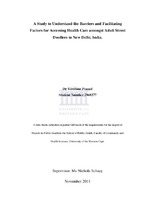| dc.description.abstract | Urban health policy has remained a neglected area in India. The homeless remain the most deprived, neglected and stigmatized group amongst the urban poor. While they suffer from a large burden of disease, there are a variety of reasons that prevent them from accessing the available health care services – particularly in the public health sector. Some interventions by concerned non-governmental organisations have attempted to circumvent the barriers to health care access faced by the homeless but these have not been well documented or assessed. This study seeks to establish both the barriers and facilitating factors for access to health care and health care seeking amongst adult street dwellers in an area of New Delhi which is known for a high concentration of homeless persons. Using a qualitative approach 18 adult street dwellers (both male and female) were individually interviewed – along with 6 key informants working in the public and non-governmental health sector. This was accompanied by a process of participant-observation. The results were analyzed by identifying recurrent themes associated with barriers and facilitating factors for access to health care by the homeless, following which a set of recommendations related to the homeless, have been developed so as to inform those working in the public health sector. In terms of ethics, informed consent was taken from each interviewee and they were explicitly given the option not to participate without adverse consequences to themselves. If any participant was found with acute health problems immediate assistance was facilitated. The study reveals a number of barriers faced by the homeless in attempting to access health care services. While minor ailments are taken care of by local private practitioners, they need to access public health care services for major problems. There they encounter many barriers due to the lack of money, delays and being shunted from place to place. Moreover, they are not able to get admission for reasons such as lack of address and the lack of an attendant. Facilitating factors include assistance for transportation, facilitation of admissions, arranging money for out of pocket expenditures on drugs and consumables,
arranging blood and providing after-care. The role of social contacts in enabling access is also demonstrated through this study. The recommendations that emerge from the study are intended to assist in policy advocacy towards a comprehensive health care system for them, as well as assist health care providers to provide a better service for homeless people. | en_US |

